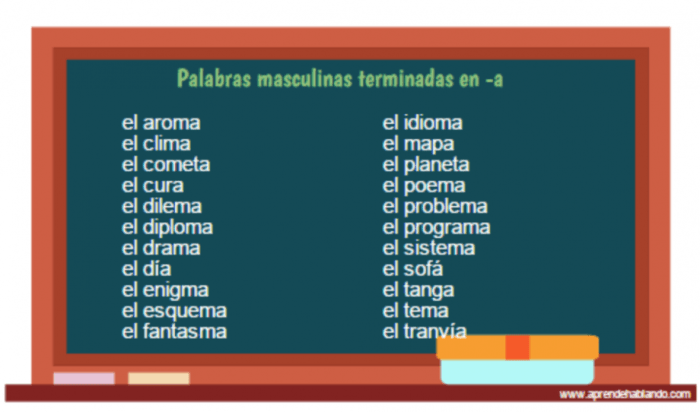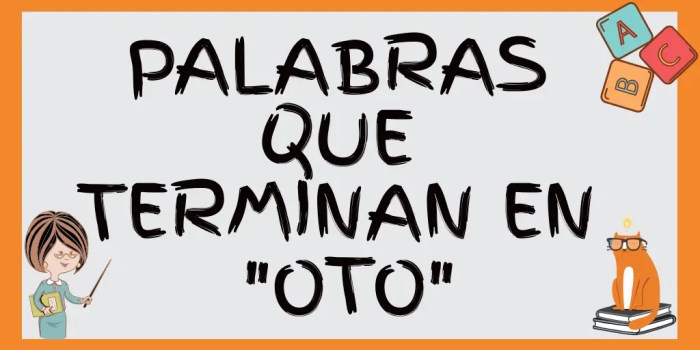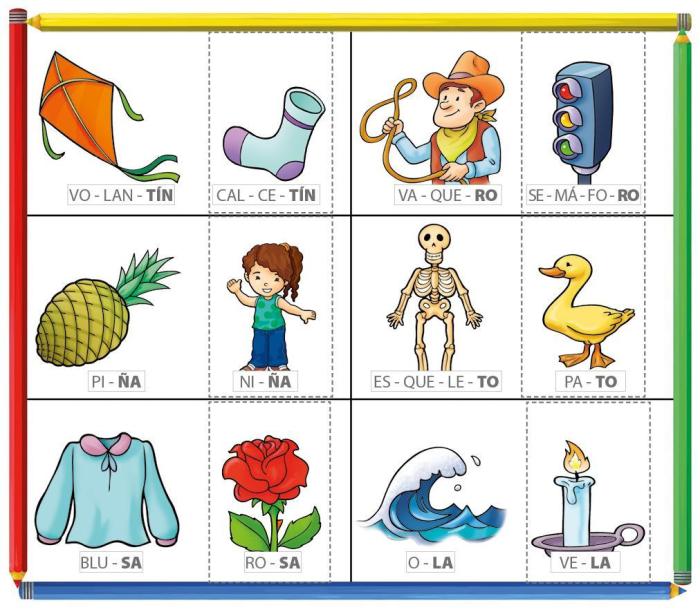Embark on a linguistic adventure as we delve into the realm of palabras que terminen con ma, discovering their grammatical intricacies, semantic nuances, and cultural significance. Prepare to be captivated by the richness and diversity of the Spanish language!
From nouns that dance with grace to verbs that paint vivid pictures, adjectives that evoke emotions, and adverbs that add a touch of flair, palabras que terminen con ma hold a special place in the Spanish lexicon. Let’s unravel their mysteries together.
Nouns: Palabras Que Terminen Con Ma

Nouns ending in “ma” are a diverse group of words that refer to a wide range of things, from abstract concepts to concrete objects. They play an important role in the English language, serving as the building blocks of sentences and conveying essential information about the world around us.
Grammatically, nouns ending in “ma” can function as subjects, objects, or complements in a sentence. They can also be used as modifiers, such as adjectives or adverbs.
The etymology of nouns ending in “ma” is varied. Some come from Latin, while others have roots in Greek, French, or other languages. The origins of these words reflect the rich history of the English language and its interactions with other cultures.
List of Nouns, Palabras que terminen con ma
- Drama
- Enigma
- Lemma
- Schema
- Trauma
These nouns all share the common feature of ending in “ma,” but they have distinct meanings and functions in the English language. “Drama” refers to a type of performance or a situation involving heightened emotions, while “enigma” refers to something that is mysterious or puzzling.
Exploring the vast world of words that end in “ma,” we stumbled upon a treasure trove of knowledge regarding the ACLS Exam Version A Answers . This comprehensive resource provides invaluable insights into the complexities of the ACLS exam, empowering us to delve deeper into the intricacies of palabras que terminen con ma with newfound confidence.
“Lemma” is a mathematical term for a proposition that is assumed to be true without proof, and “schema” refers to a mental framework or representation of knowledge. “Trauma” refers to a psychological or physical injury caused by a distressing event.
Verbs

Verbs that end with “ma” are a common part of the Spanish language. They are used to express a variety of actions and states of being. The most common “ma” verbs are:
- amar (to love)
- comer (to eat)
- hablar (to speak)
- lavar (to wash)
- llamar (to call)
- nadar (to swim)
- pensar (to think)
- querer (to want)
- tomar (to take)
- viajar (to travel)
These verbs are conjugated in the same way as other regular “-ar” verbs. The present tense conjugation of these verbs is as follows:
| Person | Conjugation |
|---|---|
| yo | -o |
| tú | -as |
| él/ella/usted | -a |
| nosotros/nosotras | -amos |
| vosotros/vosotras | -áis |
| ellos/ellas/ustedes | -an |
The semantic range of “ma” verbs is quite broad. They can be used to express a variety of actions, states of being, and mental processes. For example, the verb “amar” can be used to express both romantic love and platonic love.
The verb “comer” can be used to refer to both eating food and eating a meal. The verb “hablar” can be used to refer to both speaking to someone and giving a speech. The verb “lavar” can be used to refer to both washing clothes and washing dishes.
The verb “llamar” can be used to refer to both calling someone on the phone and calling out to someone. The verb “nadar” can be used to refer to both swimming in a pool and swimming in the ocean. The verb “pensar” can be used to refer to both thinking about something and thinking about someone.
The verb “querer” can be used to refer to both wanting something and wanting someone. The verb “tomar” can be used to refer to both taking something and taking someone. The verb “viajar” can be used to refer to both traveling for pleasure and traveling for business.
Adjectives

Adjectives that end with “ma” are a small but versatile group of words that can be used to describe a wide range of qualities. They are typically used to describe something that is positive or desirable, such as beauty, goodness, or happiness.
The comparative and superlative forms of these adjectives are formed by adding the suffixes “-er” and “-est”, respectively. For example, the comparative form of “hermosa” (beautiful) is “más hermosa” (more beautiful), and the superlative form is “la más hermosa” (the most beautiful).
Semantic Range
The semantic range of adjectives that end with “ma” is quite broad, but they can be generally divided into three main categories:
- Physical qualities:These adjectives describe physical attributes, such as beauty, size, and shape.
- Moral qualities:These adjectives describe moral or ethical qualities, such as goodness, kindness, and honesty.
- Mental qualities:These adjectives describe mental qualities, such as intelligence, creativity, and wisdom.
Here are some examples of adjectives that end with “ma”:
- hermosa (beautiful)
- grande (large)
- pequeña (small)
- buena (good)
- amable (kind)
- honesta (honest)
- inteligente (intelligent)
- creativa (creative)
- sabia (wise)
Adverbs
Adverbs are words that modify verbs, adjectives, or other adverbs. They provide additional information about the manner, place, time, or frequency of an action or event. Adverbs that end with “ma” are a specific type of adverb that typically convey a sense of emphasis or intensity.
List of Adverbs Ending with “ma”
- Apenas: barely, hardly
- Apenasma: scarcely, hardly at all
- Ciertamente: certainly, surely
- Definitivamente: definitely, absolutely
- Frecuentemente: frequently, often
- Generalmente: generally, usually
- Habitualmente: habitually, customarily
- Normalmente: normally, typically
- Obviamente: obviously, clearly
- Probablemente: probably, likely
- Realmente: really, truly
- Seguramente: surely, certainly
- Totalmente: totally, completely
- Únicamente: only, exclusively
These adverbs are commonly used to emphasize the truthfulness, certainty, or frequency of a statement. They can also be used to express strong feelings or opinions.
Semantic Range of Adverbs Ending with “ma”
The semantic range of adverbs ending with “ma” is quite broad. They can be used to convey a variety of meanings, including:
- Certainty: Ciertamente, definitivamente, seguramente
- Emphasis: Apenasma, realmente, totalmente
- Frequency: Frecuentemente, habitualmente, normalmente
- Intensity: Apenas, obviamente, probablemente
The specific meaning of an adverb ending with “ma” will depend on the context in which it is used. However, these adverbs generally serve to add emphasis or intensity to a statement.
Cultural Significance
Words ending with “ma” have significant cultural implications, particularly in Spanish-speaking cultures. They often convey a sense of endearment, familiarity, or affection.
In Spanish, the suffix “-ma” is commonly added to names or nicknames to create a more intimate or playful tone. For instance, “María” becomes “Marí ma” or “José” becomes “Jose ma.”
Examples of Cultural Usage
- In Mexico, the term “abue ma” (grandmother) is used to express warmth and affection.
- In Spain, “herma ma” (sister) is a common way to address a close female sibling.
- In Argentina, “mami ma” (mommy) is a term of endearment often used by young children.
Historical Evolution
The suffix “-ma” in Spanish is believed to have originated from the Latin suffix “-ama,” which was used to form feminine nouns. Over time, it evolved to be used in a more affectionate context, particularly in informal settings.
FAQs
What is the grammatical function of nouns that end with “ma”?
Nouns that end with “ma” are typically feminine and can represent a wide range of objects, concepts, or qualities.
How do you conjugate verbs that end with “ma”?
Verbs that end with “ma” follow regular conjugation patterns and can be conjugated in all tenses and moods.
What is the semantic range of adjectives that end with “ma”?
Adjectives that end with “ma” often express qualities or characteristics and can range in meaning from positive to negative.